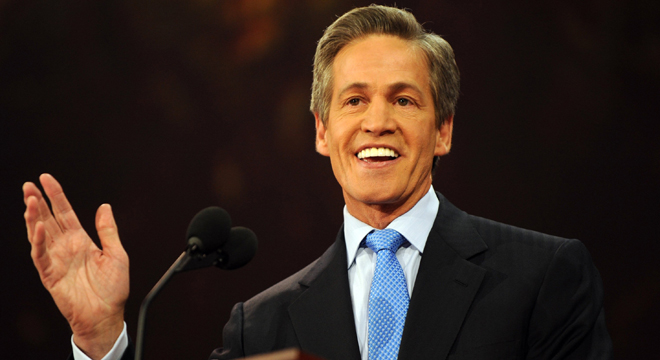Does the introduction of so-called “super PACs” drastically change the political landscape or is it just the next logical step of increasing the impact of money in politics? One person who’s not sure: former Republican Senator and current super PAC chairman Norm Coleman.
“So is it a continuum? Is it an ebb and flow? Or is it — from a little different perspective — a fundamental paradigm shift in the way American elections are conducted? Because I feel it’s a little of that too, even though it’s an ebb and flow, because the level of coordination that outside groups can do among themselves but not with candidates and not with parties is pretty incredible,” Coleman said at a breakfast with reporters hosted by the Christian Science Monitor on Tuesday.
“The reality is I can’t tell you what the ideal system is. Clearly public financing, McCain-Feingold didn’t work, didn’t work. I don’t think anyone would argue with that,” Coleman said.
Coleman, who chairs the Congressional Leadership Fund, said that knowing what parties were doing and which races they were making a priority while not technically coordinating with them wasn’t too difficult.
“You can do that, not coordinate with the parties. Today, that’s not as much of an issue: everything is out there anyway, all you have to do is look on a website,” Coleman said. “You kind of know what races are important. You don’t even need to talk to anyone today, it’s all out there.”
The Congressional Leadership fund started last month as the Republican answer to the Democrat’s House Majority PAC. Their mission, according to their website, is to “counter efforts on the left including the House Majority PAC, unions and the ACORN style groups” and to focus “solely and exclusively on maintaining and expanding the Center Right Congressional majority.”
Coleman said that traditional parties like the Republican National Committee are still very important but that third party groups can play a big role.
“Clearly, there is a place for these third party groups,” Coleman said, calling the introduction of super PACs a “work in progress.”
PAC president Brian Walsh told reporters that third party groups “fill in the gaps” for official parties and “complement, supplement but not replicate the role of the traditional party.”
In response to a question from TPM, Walsh said that their organization was monitoring the Federal Election Commission’s upcoming decision on whether candidates could appear in super PAC advertisements without those ads being considered coordinated.
“That’s not a question of whether it’s better or worse, it’s a question of whether you have a tool in your tool belt that you can use or whether you don’t,” Walsh said. “That’s more of a tactical… it will help define our tactical ability.”
Coleman said that his organization has campaign finance lawyers who tell them “very clearly” where the lines are and they follow that. “I want to be very careful with understanding what the rules are and following those rules, but as for… what the rules are, ultimately that will effect what tactical decisions, not the overall picture. So if the FEC says you can’t do something with the candidates’ image, then we don’t do something with the candidates’ image. They say you can only spend 51 percent of dollars, less than 51 percent on direct advocacy for that specific candidate than you don’t spend… you follow that rule. So ultimately it’s tactical rather than strategic.”









